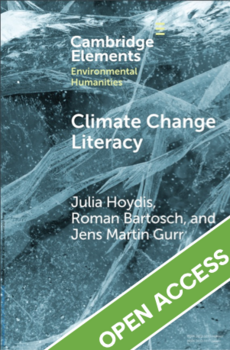
About the Book

Climate Change Literacy challenges dominant, science-centred debates on the connection between literacy and climate action that largely ignore research in the environmental humanities, and asks: How does literary reading contribute to climate change communication? How does this contribution relate to recent demands for environmental and related literacies?
Rather than reducing the function of literature to a more pleasurable form of information transfer or its affective dimension of evoking sympathy, Climate Change Literacy reassesses the cognitive, affective, and pedagogic potentials of literary writing by analysing a selection of popular climate novels and demonstrating the potential of fiction in fostering a more adequate understanding of, and response to, climate change, in literary studies, education, and public debate.
This title is also available as Open Access on Cambridge Core.
About the Authors


Roman Bartosch

Jens Martin Gurr
About the Project
The project was funded by the Volkswagen Foundation as part of the Originalitätsverdacht funding line (Az.: 9A794) from 2020-2023. It combines interdisciplinary literary studies, cultural literacies research, and education for sustainability.
Events and Impact
Interview with Roman Bartosch in a new arte documentary about Maja Lunde and her great climate fiction: Roman Bartosch, Eva Horn, Maja Lunde, Hans Joachim Schellnhuber and Pierre Schoentjes discuss functions and possibilities of literature in a changing world. May 10, 2023, 21:45 on arte TV.
Interview with Roman Bartosch for WDR 5: Roman Bartosch was interviewed by WDR 5 about the potentials of fiction for communicating climate change (March 6, 2023).
Interview with Roman Bartosch: On January 30, 2023, the Kölner Stadt-Anzeiger published an article on the narration of climate change, prompted by the publication of the science thriller Der Riss by German author Thilo Winter.
Interview Julia Hoydis with ZEIT für X, July 07, 2022.
Lecture Series: Communicating Climate Change – Interdisciplinary Perspectives. University of Duisburg-Essen, April–July 2022.
Article about the project Climate Change Literacy (CCL) in the Cologne University Magazine: Klimawandel im Roman: Was Climate Fiction leisten kann (written by Anna Becker, pp. 3–4 (suppl.), Kölner Universitätsmagazin 3/22).
“How Can We Read When Our Beds Are Burning? Teaching English Literature in Terrible Times.” Keynote by Roman Bartosch at the 2022 UNITE Summer School Sustainability in Schools and Teacher Education. International Perspectives and Impulses, University of Cologne, September 19-23, 2022.
“Literacy, Action, and Quality Education: Three Cases for Diversity.” Joint presentation by Julia Hoydis and Roman Bartosch at the 22nd European Conference on Literacy and the 46th Annual Conference of the Literacy Association of Ireland (Literacy and Diversity: New Directions), Dublin City University, July 4-6, 2022.
“Talking about Climate – Creatively.” Presentation by Roman Bartosch at the European University for Wellbeing alliance’s annual FestiWell event, May 10, 2022.
“Climate Change Literacy.” Joint presentation by Julia Hoydis, Roman Bartosch, and Jens Martin Gurr at the Literacies.net lecture series, Universities of Duisburg-Essen and Cincinnati, December 9, 2021.
“‘Kreative Kommunikationen’ und nachhaltige Narrative: Scale, Latency, Entanglements.” Presentation by Roman Bartosch at the Narrative und Metaphern zur Nachhaltigkeit conference, Bochum University, on October 7-9, 2021.
“Und so wollen wir leben?!” Participation of Julia Hoydis at a Roundtable for the Interdisziplinäres Forum des IF Weinheim, November 13, 2021, Stollwerk Köln.
Public Roundtable discussion with Julia Hoydis, Magdalena Göbl, Dirk Rossmann, Bernd Sommer and Annette Riedel at Schloss Herrenhausen, Hanover, on September 14, 2021.
“Stranger than Fiction”? (Im)probability, Multi-Species Migration, and Climate Change in Amitav Ghosh’s Gun Island.” Presentation by Julia Hoydis at the international conference “SUBJECTIVITIES OF MIGRATION. Poetics and Genre in the Literary Imagination of Migrant Experience since 1989”, Barenboim-Said Akademie, Berlin, 13. September 2021.
Interview with Julia Hoydis and Jens Martin Gurr with Boersenblatt, April 22, 2021.
Joint project presentation at the KWI Essen conference ‘Ecologies of Fear’ on 2-4.9., 2021.
Further Reading
Bartosch, Roman. “Scale, Latency, Entanglements: Wege zur Klimakompetenz durch kreative Kommunikationen.” metaphorik 33 (special issue: Narrative und Metaphern zur Nachhaltigkeit: Perspektiven für den Unterricht in sprachliche Fächern), 2023. 275-294. [link]
—. “Reading and Teaching Fictions of Climate.” Research Handbook in Communicating Climate Change. Eds. David Holmes and Lucy Richardson. Cheltenham: Edward Elgar Publishing, 2020. 349-352. DOI https://doi.org/10.4337/9781789900408.00046.
—. Literature, Pedagogy, and Climate Change. Text Models for a Transcultural Ecology. Basingstoke: Palgrave Macmillan, 2019. DOI https://doi.org/10.1007/978-3-030-33300-3.
—. “Scale, Climate Change, and the Pedagogic Potential of Literature: Scaling (in) the Work of Barbara Kingsolver and T.C. Boyle.” Open Library of Humanities 4.2 (2018) (26pp). DOI http://doi.org/10.16995/olh.337.
—. “The Climate of Literature: English Studies in the Anthropocene.” Anglistik – International Journal of English Studies 26.2 (2015): 59-70. [link]
Gurr, Jens Martin. Charting Literary Urban Studies: Texts as Models of and for the City. New York/London: Routledge, 2021. DOI https://doi.org/10.4324/9781003111009.
—. “Texte als ‘Modelle von’ und ‘Modelle für’ Stadt: Zur narrativen Modellierung von Urbanität und urbaner Komplexität.” Zeitschrift für ästhetische Bildung 11.2 (2019) (special issue “Modell”). [zaeb.net]
—. “‘Without contraries is no progression’: Emplotted Figures of Thought in Negotiating Oppositions, Funktionsgeschichte and Literature as ‘Cultural Diagnosis.’” Text or Context: Reflections on Literary and Cultural Criticism. Eds. Rüdiger Kunow, Stephan Mussil. Würzburg: Königshausen & Neumann, 2013. 59-77.
—. “Emplotting an Ecosystem: Amitav Ghosh’s The Hungry Tide as an Eco-Narrative.” Local Natures, Global Responsibilities: Ecocritical Perspectives on the New English Literatures. Eds. Laurenz Volkmann, Nancy Grimm, Ines Detmers, Katrin Thomson. Amsterdam: Rodopi, 2010. 69-80. DOI https://doi.org/10.1163/9789042028135_006.
—. (with Christian Walloth and J. Alexander Schmidt) (eds.) Understanding Complex Urban Systems: Multidisciplinary Approaches to Modeling. Heidelberg: Springer, 2014. DOI https://doi.org/10.1007/978-3-319-02996-2.
Hoydis, Julia. “Zukunftskrisen erzählen – Was Literatur zur Klimawandelkommunikation beitragen kann.” Systhema 1, 2022. 11-18. [link]
—. Risk and the English Novel. From Defoe to McEwan. Berlin and Boston: De Gruyter, 2019. Paperback Edition 2021. DOI https://doi.org/10.1515/9783110615418.
— (with Nina Engelhardt). Representations of Science in Twenty-First Century Fiction. Human and Temporal Connectivities. New York: Palgrave Macmillan, 2019. DOI https://doi.org/10.1007/978-3-030-19490-1.
—. “Dialogues with the Machine: Ruins of Closure and Control in Interactive Digital Narratives.” Open Library of Humanities 6.2, 2021. DOI https://doi.org/10.16995/olh.4695.
—. “A Slow Unfolding ‘Fault Sequence’: Risk and Responsibility in Lucy Kirkwood’s The Children.” Journal for Contemporary Drama in English 8.1, 2020. 83-99. DOI http://doi.org/10.1515/jcde-2020-0007.
—. “Realism for the Post-Truth Era. Politics and Storytelling in Recent Fiction and Autobiography by Salman Rushdie.” European Journal of English Studies 23.2, 2019. 152-171. DOI https://doi.org/10.1080/13825577.2019.1640422.
—. “Staging the Posthuman: Shakespeare to Global Climate Change Plays.” Palgrave Handbook of Critical Posthumanism. Eds. Ivan Callus, Stefan Herbrechter, Manuela Rossini. Cham et al: Springer, 2021. 703-724. DOI https://doi.org/10.1007/978-3-031-04958-3_38.
—. “(In)Attention and Global Drama: Climate Change Plays.” Research Handbook on Communicating Climate Change. Eds. David Holmes and Lucy Richardson. Edward Elgar, 2020. 340-348. DOI https://doi.org/10.4337/9781789900408.00049.
The logo and visuals employ Ed Hawkins’s famous visualisation of climate anomalies based on annual average temperatures from 1850 to 2018 using data from the UK Met Office. Used under CC-BY 4.0 licence (Climate Change Stripes: CC-BY 4.0 Ed Hawkins).
Profile pictures: © Jana Bauch/UoC; © Jasmijn Visser
